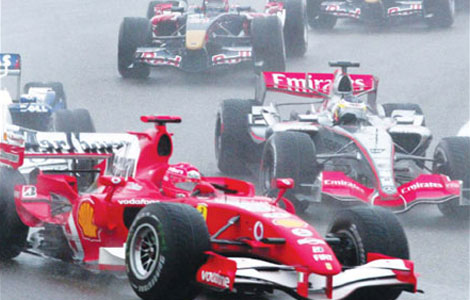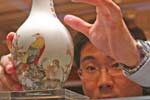Asia
Calls grow for Japan PM to quit in wake of quake
Updated: 2011-04-15 10:14
(Agencies)
TOKYO - Japan's fragile post-disaster political truce unravelled on Thursday as the head of the main opposition party called on Prime Minister Naoto Kan to quit over his handling of the country's natural calamities and a nuclear crisis.
|
![Japan's Prime Minister Naoto Kan bows to the national flag as he arrives at a news conference at his official residence in Tokyo April 12, 2011. [Photo/Agencies] Calls grow for Japan PM to quit in wake of quake](../../attachement/jpg/site1/20110415/002170196e1c0f11e07848.jpg) Japan's Prime Minister Naoto Kan bows to the national flag as he arrives at a news conference at his official residence in Tokyo April 12, 2011. [Photo/Agencies] |
At the stricken Fukushima Daiichi plant in the northeast of the country, engineers were struggling to find a new way to cool one of the six crippled reactors and Japan's Nuclear and Industrial Safety Agency said it was now "highly likely" there was a hole in the suppression unit of the reactor.
Kan, whose public support stands at about 30 percent, had sought a grand coalition to help the country recover from its worst ever natural disaster and enact bills to pay for the country's biggest reconstruction project since World War Two.
|
||||
But the head of the main opposition Liberal Democratic Party (LDP) -- who last week ruled out joining hands -- on Thursday pressured Kan to go.
"The time has come for (the prime minister) to decide whether he stays or goes," Kyodo news agency quoted Sadakazu Tanigaki as telling a news conference.
Tanigaki's comment reflects the view of many in his conservative party that Kan must step down as a precondition for any coalition as well as a hope that criticism of Kan within his own Democratic Party will gather steam after party powerbroker Ichiro Ozawa blasted the premier over his crisis management.
Upper House speaker Takeo Nishioka, a well-known Kan critic from the Democrats, also urged Kan to resign, Kyodo said.
Kan, however, who took office last June as Japan's fifth leader since 2006, is not likely to step down readily, while opposition parties could come under fire if they try to take disaster budgets hostage in a political battle, analysts said.
"Kan will probably ignore this," said Koichi Nakano, a Sophia University professor. "If they thought of the national interests, would they (Kan's critics) do this now?"
Still no closer to solving nuclear crisis
Five weeks ago a massive earthquake and tsunami left nearly 28,000 dead or missing, devastated a broad swathe of northeast Japan and damaged the Fukushima nuclear plant. There has been no sign of a resolution of the atomic crisis.
The nuclear safety agency said a new plan for cooling one of six reactors at the plant, 240 km (150 miles) northeast of Tokyo, may be needed due to the large volume of highly radioactive water on site, and tests would be done to determine if damaged spent fuel rods were emitting radiation.
"It may be difficult to completely remove the contaminated water and so allow work to proceed (in restoring power to the cooling pumps). We may need to think of other options," said Hidehiko Nishiyama, a deputy director-general of Japan's Nuclear Industry and Safety Authority.
Nishiyama said there was 20,000 tons of contaminated water in the basement and a tunnel under reactor No 2.
"What makes the No 2 unit decisively different from No 1 and No 3 units are that it is highly likely that there is a hole on the (No 2 unit's) suppression chamber after as an explosion was heard. It would be an accurate speculation that there is leakage."
Engineers are also concerned that some spent fuel rods were damaged by the March 11 earthquake and tsunami and could be emitting high levels of radiation.
Japan's nuclear crisis has been rated on par with the world's worst nuclear crisis at Chernobyl in 1986, although the total amount of radiation released is only a fraction of that when the nuclear plant in Ukraine exploded.
Japan has expanded a 20-km (12-mile) evacuation zone around the plant because of high accumulated radiation. No radiation-linked deaths have been reported and only 21 plant workers have been affected by minor radiation sickness.
E-paper

Green light
F1 sponsors expect lucrative returns from Shanghai pit stop
Preview of the coming issue
Toy for rich boys
Reaching out
Specials

Share your China stories!
Foreign readers are invited to share your China stories.

No more Mr. Bad Guy
Italian actor plans to smash ‘foreign devil’ myth and become the first white kungfu star made in China.

Art auctions
China accounted for 33% of global fine art sales.




